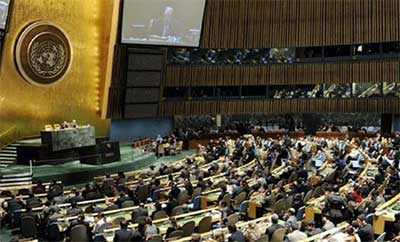Daily-current-affairs
/
05 Nov 2020
Resolution on Counter-Terrorism : Daily Current Affairs

Resolution on Counter-Terrorism
Why in NEWS ?
- India’s resolution on counter-terrorism is adopted by UN General Assembly.
About
- Permanent Representative of India to the United Nations T S Tirumurti on 5 th
October 2020, announced that India’s annual resolution on the issue of counter-
terrorism was co-sponsored by over 75 countries and adopted by consensus in the
First Committee of the UN General Assembly.
- Annual resolution tabled by India ‘Measures to prevent terrorists from acquiring
weapons of mass destruction’ was co-sponsored by more than 75 countries and
adopted by consensus in First Committee of UN General Assembly.
- India, a victim of state-sponsored cross-border terrorism, has been at the forefront
in highlighting the serious threat to international peace and security emanating from
acquisition of weapons of mass destruction by terrorist groups.
- Through its annual resolution, ”Measures to prevent terrorists from acquiring
weapons of mass destruction”, India has urged greater international co-operation to
prevent terrorists from acquiring weapons of mass destruction.
- This resolution, co-sponsored by more than 75 countries, was adopted by consensus
without a vote.
- India’s call for strengthening national measures to address this issue at the General
Assembly also predates the adoption of resolution 1540 by the Security Council.
- Earlier this week, the First Committee of UN General Assembly, which deals with
disarmament, global challenges and threats to peace that affect the international
community, adopted two resolutions which were sponsored by India - Convention
on the Prohibition of the use of Nuclear Weapons' and Reducing Nuclear Danger' -
under the Nuclear weapons' cluster.
Convention on the Prohibition of the use of Nuclear Weapons
- It was tabled by India since 1982 in the General Assembly requests the Conference
on Disarmament in Geneva to commence negotiations on an international
convention prohibiting the use or threat of use of nuclear weapons under any
circumstances.
- The resolution, which is supported by a majority of UN members, reflects India's
conviction that such a multilateral, universal and legally binding agreement would
generate necessary political will among States possessing nuclear weapons to
engage in negotiations leading to the total elimination of nuclear weapons.
Resolution on 'Reducing Nuclear Danger'
- It was tabled since 1998, draws global attention to the risks of unintentional or
accidental use of nuclear weapons and underscores the need for a review of nuclear
doctrines.
- It calls for concrete steps to reduce such risks, including through de-alerting and de-
targeting of nuclear weapons.
UN Security Council Resolution 1540 (2004)
- In resolution 1540 (2004), the Security Council decided that all States shall refrain
from providing any form of support to non-State actors that attempt to develop,
acquire, manufacture, possess, transport, transfer or use nuclear, chemical or
biological weapons and their means of delivery, in particular for terrorist purposes.
- The resolution requires all States to adopt and enforce appropriate laws to this
effect as well as other effective measures to prevent the proliferation of these
weapons and their means of delivery to non-State actors, in particular for terrorist
purposes.
- It obliges all states to refrain from supporting by any means non-state actors from
developing, acquiring, manufacturing, possessing, transporting, transferring or using
nuclear, chemical or biological weapons and their means of delivery.
- The Role of the UN Office for Disarmament Affairs (UNODA) in support of the
Committee established pursuant to Security Council Resolution 1540 (2004).
- The UN Office for Disarmament Affairs provides support for activities of the
Committee established pursuant to resolution 1540 (2004), which is tasked to report
to the Security Council on the implementation of the resolution. Currently, UNODA
activities are focussing on the following key areas:
- Facilitation of national implementation activities including through
regionally coordinated approaches
- Cooperation between international, regional and sub-regional
organizations
- Effective partnerships of key stakeholders including civil society, private
sector and academia







